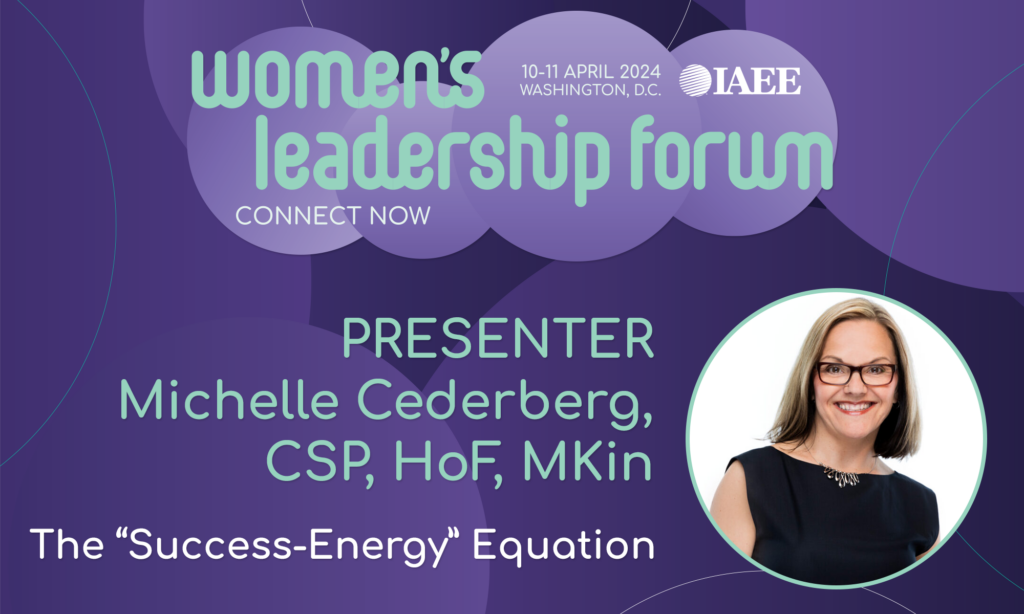By Mary Tucker | Sr. Communications & Content Manager | IAEE

Michelle Cederberg, CSP, HoF, MKin will present the session, The “Success-Energy” Equation: Beat Burnout. Harness Your Energy. Streamline Success., at this year’s Women’s Leadership Forum on 10-11 April in Washington, D.C. This high-energy keynote offers a look into Michelle’s years of studying top-performing professionals culminating in her latest book, The Success-Energy Equation, where she connects the dots between rarely recognized or exercised resources that can be streamlined into success, reduce stress and eliminate exhaustion.
Michelle draws from her research to teach individuals how to fail-proof their routines, clarify their goals and break free from the traps of distraction. She also uncovers a powerful combination of scientific facts, health truths and laughable human behaviors that can take professionals from average ambition to crafting their personalized formulas for success.
As President of Live Out Loud, Inc. and a health and productivity expert for more than 20 years, Michelle has captivated audiences across North America with her empowering and humorous messages about how to set worthwhile goals, get energized for success and live a bigger life.
An in-demand speaker, author, coach and consultant, she believes that personal and professional success is directly influenced by how well we harness the physical, mental and emotional capacity we each have within us. She enthusiastically calls on science to help people boost that capacity to gain clarity, build confidence and develop the discipline to create the life and career they want.
Michelle holds a Master’s in Kinesiology, a Bachelor of Arts in Psychology, and a specialization in Health & Exercise Psychology. She is a Certified Speaking Professional, Certified Exercise Physiologist and High-Performance Coach. In 2023 she was inducted into the prestigious Canadian Speaking Hall of Fame. She truly combines mind, body, and practicality to inspire change.
You help individuals develop a clearer understanding (and newfound sense of humor) about where their energy is being “poured, invested or drained.” What makes this process life-changing and how can people build upon this knowledge?
Michelle: As busy, driven women, we’ll often underestimate how much we do in a given day, or we’ll downplay the impact that certain events might have on our energy, and then we beat ourselves up if we come up short on a goal or plan. In my Success-Energy presentation, one of the first things I do is shine a light on why – on our path to higher levels of success – it can be so challenging to find the time, energy and focus we need to stay the course (even when we’re chasing something we want), and I do so in a fun and enlightening way.
I call it my ‘bad math’ formula for success, and, to me, it ‘normalizes’ the busyness of life just enough, so that we can focus less on our shortcomings, and more toward how to address and navigate the busyness.
It’s a life-changing process because the formula provides a reminder that along with all the things we need to do to drive success, our days are full of other demands on our time, energy and focus – some of which we can control, and so much of it that we can’t – that can slow our success path.
Once we recognize this, we can begin to prioritize what truly matters, and better manage our focus and energy moving forward.
My ‘bad math’ formula generates a lot of laughter, sure because it’s funny, but mostly because people can relate to the absurdity of how much pressure we put on ourselves to ‘do it all’ without acknowledging how much we already do.
You can almost hear the stress go down in the room as people realize, “Wow, I never thought of it like that. I guess I am capable of more than I give myself credit for.”
You also teach people how to overcome common barriers like distractions and bad habits in order to become more consistent with their goals and outcomes. What are some of the obstacles that your clients have found most surprising when they dive into examining their behaviors?
Michelle: Less so than the specific obstacles themselves, I think what’s most surprising for my clients and audience members is the awareness of how often the distractions and bad habits happen on autopilot.
When we’re busy, stretched and stressed, we’ll almost unconsciously seek moments of reprieve in dopamine-producing activities like scrolling social media, shopping online, or engaging in other mind-numbing activities (in the digital space or otherwise). Or we’ll procrastinate the necessary tough tasks in favor of work we like doing, even if it’s lower on the priority list. Those shifts tend to happen without us fully realizing it, and we often underestimate how much time we actually waste in this space. The distractions may be short-lived, but they’re frequent.
When we become aware of the ways we distract ourselves, or the habits that we default to that get us off track, we can get present to the doing the right work, on the right things, more often, and move those important goals and outcomes forward.
You explore four science-backed variables that can significantly impact a person’s goals, confidence, productivity and success. How did you determine that these factors are the most impactful and what makes their combination so powerful?
Michelle: As I was pondering the response to this question I had to chuckle, because even though these four science-backed variables are indeed an impactful and powerful combination, they’re nothing new and ground-breaking. I came to these four variables through a great deal of reading and research around what drives success, through interviews and conversations with individuals who would be viewed as successful, and finally, through an exploration of my own success habits (or lack of them… I’m a student of all that I teach 😉).
The four variables are GOALS, BELIEF, DISCIPLINE and ENERGY, shared in what I call my simple Success-Energy Equation.
To explain, for each of us, success requires that we set clear and exciting goals, which we achieve through a combination of belief in ourselves, and discipline to do the work the goal requires. The energy variable is perhaps the outlier, because we can achieve success without it, but with better physical, mental and emotional energy, we can elevate the other three variables and drive success to even higher levels, in ways that many likely haven’t thought about.
While the variables may not be new and ground-breaking, I share them in a relatable, mindset-shifting way while also reminding people that we all generally know what it takes to be successful, so let’s not overthink it. Instead, let’s get to it.
You also challenge professionals to update their interpretations of “success” by optimizing and eliminating unnecessary stressors so they can boost productivity and reach new heights of genuine success. How does one’s internal narrative about success determine their level of satisfaction with their accomplishments?
Michelle: Our internal narrative about success – what we want it to look like, how we’ll get it, whether we’re capable, whether we deserve it – is absolutely central to the actions we’ll take, and yes, whether we’ll be happy with the results. If we’re not clear on the goal, we’ll miss it. If we don’t believe we can, we won’t. If we believe we can, but chase the wrong dream, it won’t feel like success. That’s where some of the stress of success comes from.
We can eliminate some of that stress by getting clearer about what success looks like in our own lives, because it’s different for everyone, and there’s nothing more energy-draining than ‘comparison-itis’ or keeping up with the Joneses.
Once you define your version of success, that internal narrative will change. You’ll have clarity of vision. Your belief in self will strengthen, and you’ll be more apt to do the work.
In a world where demands on our time, energy and focus are higher than ever, we need to be reminded of the basics so we can rise above the noise. My simple Success-Energy Equation provides that reminder in a fun, accessible way.



